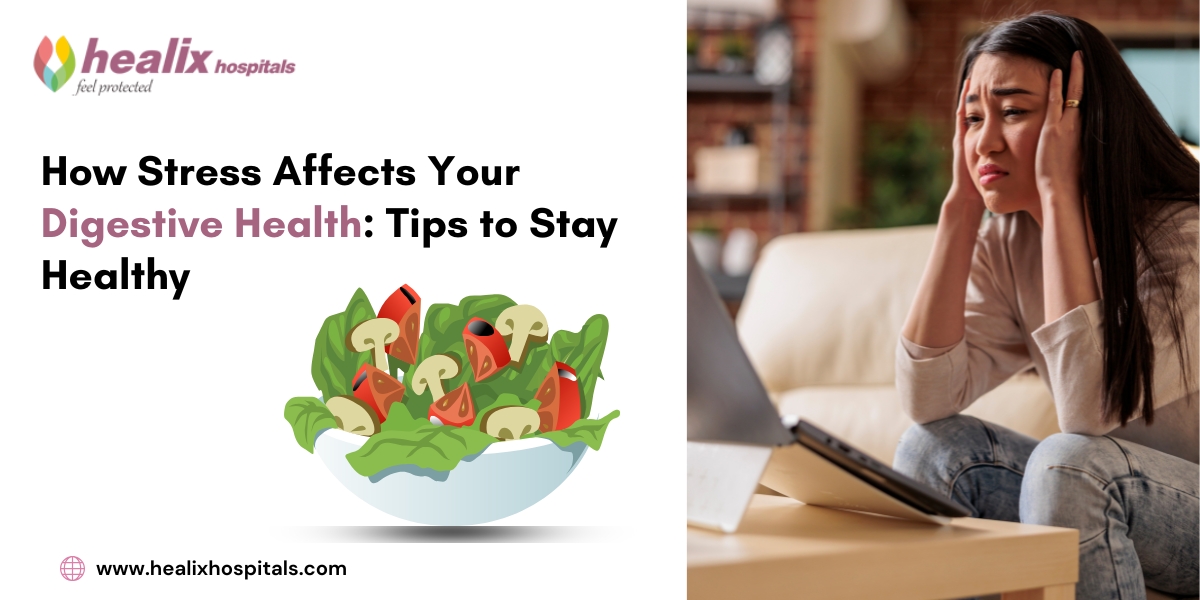

Stress has become an inevitable part of modern life, often manifesting in physical ways that we may not immediately recognize. One of the most affected systems is our digestive system. The intricate relationship between stress and digestive health underlines why managing stress is crucial for overall well-being. This blog explores the impact of stress on gut health, the stress-induced digestive problems it can cause, and effective tips for maintaining a healthy digestive system.
Understanding the Connection Between Stress and Digestive Health
The relationship between stress and digestive health is largely driven by the gut-brain axis. This communication pathway connects your brain and gut, creating a feedback loop where stress can directly affect digestion. When stress becomes chronic, it can lead to significant disruptions in digestive health, manifesting as symptoms such as bloating, diarrhea, constipation, or even conditions like irritable bowel syndrome (IBS).
The Impact of Stress on Gut Health
The impact of stress on gut health is profound, altering how your digestive system functions in several ways:
- Digestive Slowdowns: Chronic stress can slow digestion, causing bloating and constipation.
- Accelerated Digestion: In contrast, some individuals experience rapid digestion during stress, resulting in diarrhea or cramping.
- Increased Acid Production: Stress triggers excess acid production, leading to stomach issues such as acid reflux or heartburn.
- Imbalanced Gut Microbiota: Stress disrupts the balance of beneficial and harmful bacteria in your gut, exacerbating conditions like IBS.

Common Stress-Induced Digestive Problems
Chronic stress can trigger a variety of stress-induced digestive problems, including:
- Irritable Bowel Syndrome (IBS): A condition characterized by abdominal pain, bloating, and irregular bowel habits.
- Acid Reflux: High-stress levels aggravate GERD symptoms, leading to persistent discomfort.
- Inflammatory Conditions: Stress can worsen chronic conditions like Crohn's disease and ulcerative colitis.
- Bowel Irregularities: Stress may cause alternating episodes of constipation and diarrhea, disrupting daily life.
Tips for Managing Stress and Digestive Health
Maintaining a healthy gut while managing stress is achievable with the right strategies. Below are tips to support your digestive health and reduce stress-related issues:
1. Focus on Stress Relief for Digestive Disorders
Stress directly impacts digestion, making stress management critical. Here’s how you can achieve stress relief and protect your gut:
- Meditation and Deep Breathing: These practices calm your mind and support the gut-brain connection.
- Exercise Regularly: Physical activity alleviates stress and promotes healthy digestion.
- Professional Therapy: If stress feels overwhelming, consider speaking to a mental health professional.
2. Follow a Gut-Friendly Diet
A balanced diet is a cornerstone of good digestive health:
- Include probiotics like yogurt or kefir to replenish beneficial gut bacteria disrupted by stress.
- Eat fiber-rich foods to prevent constipation and support a healthy gut microbiome.
- Avoid trigger foods like caffeine, alcohol, and processed foods that worsen stomach issues.
3. Reduce Stress for Digestion
Chronic stress negatively impacts digestion. Implementing daily habits like mindful eating, relaxation techniques, and regular physical activity can go a long way in reducing stress for digestion.

4. Stay Hydrated
Dehydration can exacerbate stress-related digestive problems. Drink plenty of water throughout the day to support smooth digestion and overall gut health.
5. Seek Professional Help
Persistent symptoms of stress-induced digestive problems like IBS or GERD require professional intervention. At Healix Hospitals, we specialize in diagnosing and treating stress-related digestive health and anxiety issues.
The Role of Healix Hospitals in Managing Stress and Digestive Health
At Healix Hospitals, we recognize the critical link between stress and digestive health. Our holistic approach focuses on treating both physical and mental health issues to restore balance. Whether you’re dealing with stress and stomach issues or more severe conditions like IBS, our team of experts is here to help.
Long-Term Benefits of Reducing Stress for Digestive Health
Focusing on stress relief for digestive disorders not only alleviates immediate symptoms but also improves long-term gut health. Here’s how:
- Enhances nutrient absorption, supporting overall health.
- Strengthens the gut microbiome, reducing inflammation.
- Improves mental health through the gut-brain connection.
By managing stress effectively, you can prevent recurring stress-induced digestive problems and achieve optimal digestive health.
Conclusion
The undeniable connection between stress and digestive health underscores the importance of managing stress to protect your gut. Chronic stress disrupts the gut-brain connection, causing a range of digestive problems that can significantly impact your quality of life. However, by adopting gut-friendly habits and managing stress, you can improve your overall health.
If you’re struggling with stress-induced digestive problems, consult the experts at Healix Hospitals for personalized solutions. Your health deserves the best care, and we’re here to support you every step of the way.
Heal your gut, heal your life—with Healix Hospitals.
Also Read: How Stress and Anxiety Contribute to Head and Neck Pain – Healix Hospitals